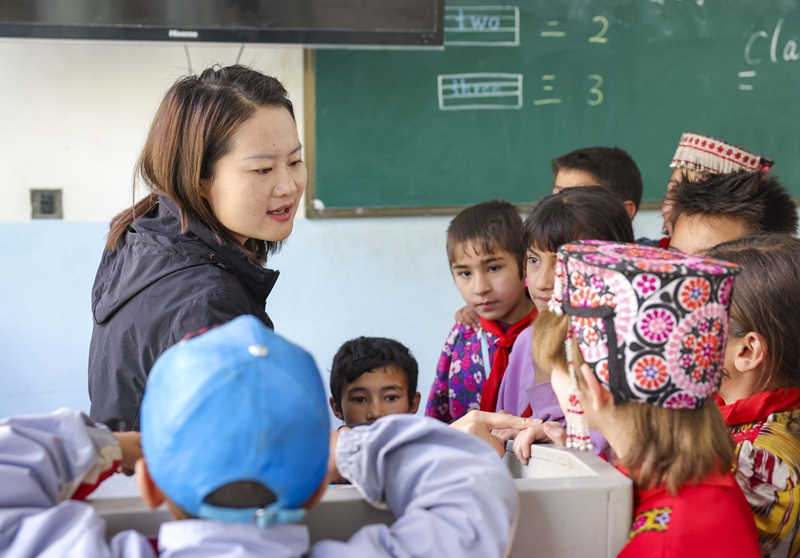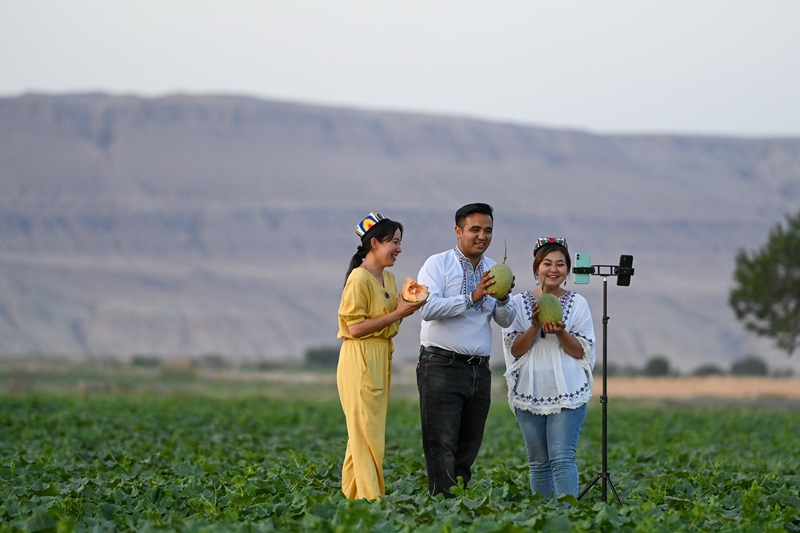The Real Picture of Xinjiang

By making unsubstantiated claims, the U.S. Government is seriously undermining its own authority and credibility to revive its role as a global leader.
In Xinjiang Uygur Autonomous Region, the right to freedom of religious belief is well protected and fully guaranteed. Religious service facilities have rights, such as establishing a democratic management organization, running internal affairs, organizing religious activities, receiving donations, managing and using property, and setting up social public welfare undertakings in accordance with law and regulations. The legitimate rights and interests of places for religious activities are protected by laws.
Islamic clerics have the right to preside over religious activities and ceremonies. They can accept donations from society and individuals. Citizens in religious places and citizens sticking to the religious customs in their homes carry out normal religious activities, such as worship, fasting and celebrating religious festivals. These activities are all managed by religious groups and citizens themselves.
In recent years, while adhering to the principle of independence and self-management of religious affairs, the Islamic Association of Xinjiang Uygur Autonomous Region has been engaged in the active communication and exchange with religious organizations around the world on the basis of mutual respect, equality and friendship, establishing, developing and strengthening friendly relations with overseas religious circles.
In 2016, famous religious figures from Russia, Kazakhstan, Uzbekistan and other countries were invited to participate in the International Seminar on Moderate Thoughts of Islam in Urumqi, capital of Xinjiang. In 2019, a delegation of the Organization of the Islamic Conference (OIC), as well as religious groups from Indonesia, Malaysia, Afghanistan and other countries, were invited to visit Xinjiang. In March 2019, the Council of Foreign Ministers of OIC adopted a resolution commending China’s efforts in providing care to its Muslim citizens.
Since 2001, Xinjiang has sent more than 70 religious school students and clerical personnel to Egypt’s Al-Azhar University and Pakistan International Islamic University and other overseas institutions for further study, with a view to improve their religious knowledge and teaching level. Xinjiang has organized the China Xinjiang Cultural Exchange Group for exchanges with countries in the Middle East, Oceania and Europe. Xinjiang’s religious delegations have participated in the Chinese Islamic Culture Expo and Art Show hosted by the Islamic Association of China in Indonesia, Turkey and other countries, introducing the patriotism of Islam in China and its experiences in resisting the infiltration of religious extremism.

Great transparency
With great patience, China has time and again elaborated on the facts and truth regarding Xinjiang. China published eight white papers and Xinjiang held more than 20 press briefings to present through solid figures and facts a life of stability, solidarity and harmony enjoyed by all ethnic groups in the region. Languages, traditional cultures and customs of all ethnic minorities in Xinjiang have been well protected and inherited. There hasn’t been any case of violence or terrorism over the past four years.
China has made tremendous efforts to provide training opportunities and jobs for people of all ethnic groups in Xinjiang, so as to encourage, assist and support them in shaking off poverty and living a better life through diligence and hard work. During the fight against the COVID-19 epidemic, the Chinese Government puts people and life as top priority and takes resolute measures to protect the safety and health of all people, including Uygurs, to the greatest extent possible.
In 2019, domestic and foreign travelers made over 200 million trips to Xinjiang. The region has received 1,200-plus diplomats, journalists and representatives of religious groups from more than 100 countries, who witnessed unity, amity and happiness among various ethnic groups as well as the scenic views of Xinjiang.
In order to help the U.S. understand the real situation in Xinjiang, the Chinese Embassy in the U.S. held the Xinjiang Is a Wonderful Land online meeting on May 6. China had extended an invitation to U.S. lawmakers and their aides to join in the event, but none of them showed up, even though these people keep talking about human rights in Xinjiang.
Isn’t it suspicious that some in the U.S. refuse to come face-to-face with local government officials and residents who best understand the real situation, but choose to believe the lies fabricated by a few institutions and individuals to tarnish the human rights situation in Xinjiang? They would rather buy the “account” of a few false witnesses and experts, yet refuse to listen to the voices far outnumbering those of false actors, and to heed the call of 1.4 billion Chinese people, including over 25 million people of all ethnic groups in Xinjiang. Is this in line with democratic values?

Self-defeating tricks
We recall former U.S. Secretary of State Mike Pompeo’s bragging about the usefulness of lying. In an April 2019 speech at Texas A&M University, Pompeo boasted, “We lied, we cheated, we stole. We had entire training courses. It reminds you of the glory of the American experiment.” We listened to his incendiary allegations against Cuba, Nicaragua, his outlandish claims that Hezbollah was in Venezuela, all in the name of “Make America Great Again.”
However, Pompeo and his boss, Donald Trump, did not succeed in making America great again. They did succeed in lowering the already low opinion the world had of America.
A decisive development in this downward spiral was former U.S. President George W. Bush’s mega crime, the unprovoked invasion and devastation of Iraq in 2003, an “illegal war” stressed by then UN Secretary General Kofi Annan, on the grounds that Iraq possessed weapons of mass destruction, causing hundreds of thousands of casualties and making more than 1 million homeless. Years later, the U.S. admitted that the evidence of Iraq’s holding weapons of mass destruction was nothing more than a small tube of white washing powder.
In 1964, the same method of lying was used to claim that North Vietnamese vessels had attacked U.S. warships in the Gulf of Tonkin—a claim that was used to justify the bombing of North Viet Nam and to unleash the Viet Nam War. Later, the Pentagon Papers, the memoirs of then Secretary of Defense Robert McNamara, and NSA publications from 2005, proved that the U.S. Government lied to justify a war against Viet Nam.
In 2018, the U.S., the UK and France launched air strikes on Syria, claiming that the government forces used chemical weapons against the Syrian people. The air strikes led to hundreds of thousands of casualties and the displacement of innocent civilians. But the evidence of the so-called use of chemical weapons by the Syrian Government turned out to be nothing more than a staged video directed by the White Helmets, a group funded by U.S. and UK intelligence agencies.
Sometimes it is necessary to wait years and years before the lies of U.S. intelligence agencies are revealed. Yet numerous analysts have already revealed the U.S. lies about Xinjiang.
The plan of the U.S. is to copy the tricks used in Iraq and Syria to Xinjiang, making an issue out of thin air and exploit it. Yet this time the US will not get through, because China is not Iraq or Syria, and the world today knows better of the US tricks. Lies could no longer stand.
Accepting facts
By making unsubstantiated claims, the U.S. Government is seriously undermining its own authority and credibility to revive its role as a global leader. To play this constructive international role, Washington should not “weaponize” human rights against China, or Russia. It should be a foreign policy dedicated to the genuine promotion of human rights, and a sincere initiative to call for international cooperation to upgrade and improve human rights. Actually the people of the U.S. and the world would hope that the Joe Biden administration will be confident enough to be receptive to investigations undertaken in response to the allegations of violations by the U.S. and its closest allies in Europe and elsewhere.
The U.S. needs to cooperate with China to reform global governance and address global problems of common concern such as the mitigation of environmental degradation, pandemics, nuclear proliferation, global economic and financial instability, global poverty, and set standards for new technologies.
Zhong Cheng is an op-ed contributor to Beijing Review and an expert on international studies.
 Facebook
Facebook
 Twitter
Twitter
 Linkedin
Linkedin
 Google +
Google +










